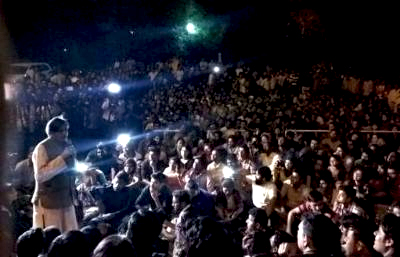New Delhi, Mar 21: Taking a dig at ruling BJP over its stand on the JNU row, Congress leader Shashi Tharoor has said that nationalism is now decided by whether one can say 'Bharat Mata Ki Jai' or not.

"Today, nationalism is decided by whether or not one can say 'Bharat Mata Ki Jai'. I am happy to say it, but should I also oblige everyone to say it?
"Our Constitution gives people the right not to say it just as it gives people the right to say it as well. I will choose when to say it and that's democracy," Tharoor said addressing students at JNU on Sunday night.
Tharoor said our country is not just 'Hindi, Hindu and Hindustan' and called for an India 'more accepting of diversity' which he said has been the tradition throughout history.
"India is not just Hindi, Hindu and Hindustan. We want an India with both Krishna and Kanhaiya Kumar. We want in India people from every corner of this vast land an equal stake in our future.
"If we understand that the Indian civilisation allows many religions, celebrates range of opinions and is today sustained by constitutional democracy which stands for certain values that all of us claim as our own, if this is the Indian legacy we can live, then we can all stand under that flag and celebrate," he said.
Tharoor was speaking on 'JNU and Nationalism' outside the administrative hall of the varsity which has been the centre of protests ever since sedition charges were slapped on three students over an event held where anti-national slogans were allegedly raised.
Tharoor appreciated the students for stirring a debate on vital issues in India, saying student days are the days "to expand one's consciousness".
"You may have come here for education but you are also educating the nation. What is happening here has given the whole nation an education in the vital issues of dissent and democracy, sedition and of course of 'azaadi' (freedom)," he said.
Tharoor's nearly 40-minute long speech was dotted with historical anecdotes and personal experiences and he repeatedly quoted personalities like Jawaharlal Nehru and Everlyn Beatrice Hall to drive home the idea of tolerance and diversity and their importance in India.





Comments
vote bank politics of BJP.....why this kind of problems happening around.....people are happy with or without saying the slogan...let them decide when to say and when not to say....cant be imposed upon them....are busy with their livelihood....don't disturb them...this is not an issue at all....don't give a damn in to it....it does not mean that we don't love India....we love India million times more than chuddies....India is great and Allah bless India....
Haha jakhas mastan Anthe ....let me explain u bastard ...yaava magane adru ..yaarge mosa madidru ...hetta taayi ge back stab madlikke saadyane illa ...we treat where we are born as bhoomi taayi ..that's why nationalist Indians say Bharath mata ki jai to instill patriotism...no Hindus Christians Sikhs Jain's and Buddhists never back stab India .u madrasa rank student ...my question to u ..on what basis u will say 72 virgins guaranteed for jihadists and ur prophet is the last one ? On what basis u say 72 virgin males are not guaranteed for Muslim assholes ..the way you cannot prove ...same thing there are many unanswered questions artha aitha ...back stabbers don't understand why we say ...haha ...Muslims captured throne everywhere by back stabbing ...it is bitter truth ...now our mossad is banging them like hell from all corner ..soon our thaliava trump will join the bandwagon ...jai ho Israel ...jai Shri Shri modi ...jai sangh parivar.
BHARAT AMMI KI JAI.....New Slogan starts soon....
What a jhakaas answer by masthan bhai.
NAME BHARAT CAME FROM BHARAT THE EMPEROR. HE WAS THE SON OF SHAKUNTALA.
I DONT UNDERSTAND WHY PEOPLE OF INDIA CALL BHARAT MATA. AND NOT BHARAT PITHA.
MAA KE LEG KE NEECHE JANNAT HAI BUT STILL
MUSLIMS DONT TOUCH THE FEET OF THEIR OWN MOTHER. THAT DOESENT MEAN THAT THEY DONT LOVE THEIR MOTHER.
IF SOME MUSLIMS DONT CALL BHARAT MATA KI JAI. THAT DOESN'T MEAN THAT THEY DONT LOVE INDIA.
Add new comment